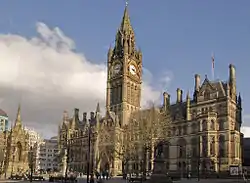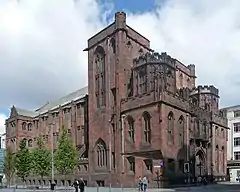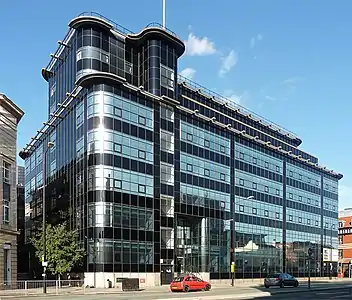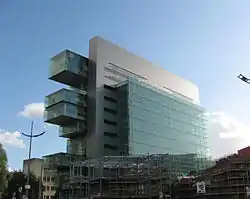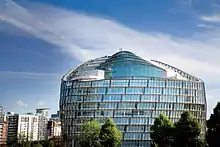Statue of Emmeline Pankhurst
The statue of Emmeline Pankhurst (officially called Rise Up Women[1]) is a bronze sculpture in St Peter's Square, Manchester, depicting Emmeline Pankhurst, a British political activist and leader of the suffragette movement in the United Kingdom. Hazel Reeves sculpted the figure[2] and designed the Meeting Circle[3] that surrounds it.
| Rise Up Women | |
|---|---|
.jpg.webp) | |
| Artist | Hazel Reeves |
| Year | 2018 |
| Type | Bronze |
| Location | Manchester, M2 3AE United Kingdom |
| 53°28′40″N 2°14′35″W | |
The statue was unveiled on 14 December 2018, the centenary of the 1918 United Kingdom general election, the first election in the United Kingdom in which women over the age of 30 could vote.[4] It is the first statue honouring a woman erected in Manchester since a statue of Queen Victoria was dedicated more than 100 years ago.[5][6]
The WoManchester Statue Campaign
The statue was created following a five-year project called the WoManchester Statue campaign.[7] This was led by Manchester City Councillor Andrew Simcock. He had initiated the campaign following a meeting in March 2014 with his friend Anne-Marie Glennon in the Sculpture Hall in Manchester Town Hall. Over coffee she had commented "these (busts) are all men. Where are the women!"[8]
Simcock’s campaign was also inspired by a craftivism exhibition held at Manchester Town Hall during February and March 2014.[9][10] Frustrated by the gender imbalance in Manchester's civic statues, Warp & Weft (artist Helen Davies and heritage researcher Jenny White) devised the Stature project, yarnbombing eight male portrait busts with crochet masks depicting local historical women of achievement.[11]
Councillor Simcock invited Warp & Weft to restage their exhibition on 30 July 2014, the day Manchester City Council gave its unanimous backing to his resolution that a 'statue of a woman of significance to Manchester' be created.[12]
Initially a twenty-strong list of women was compiled for consideration for the statue:[13]
- Margaret Ashton (1856–1937): first female city councillor for Manchester
- Lydia Becker (1827–1890): suffragist, botanist and astronomer
- Louise Da-Cocodia (1934–2008): nurse and social campaigner
- Margaret Downes (d.1819) killed at the Peterloo Massacre
- Elizabeth Gaskell (1810–1865): novellist and social reformer
- Annie Horniman (1860–1937): theatre patron
- Sunny Lowry (1911–2008): English Channel swimmer
- Kathleen Ollerenshaw (1912–2014): mathematician, educationalist and Lord Mayor of Manchester
- Emmeline Pankhurst (1858–1928): leading suffragist
- Christabel Pankhurst (1880–1958): leading suffragist
- Sylvia Pankhurst (1882–1960): leading suffragist
- Mary Quaile: Trade Unionist
- Elizabeth Raffald (1733–1781): businesswoman and author
- Esther Roper (1868–1938): suffragist and trade unionist
- Enriqueta Rylands (1843–1908): founder of the John Rylands Library
- Olive Shapley (1910–1999): radio broadcaster
- Shena Simon (1883–1972): educationalist and political reformer
- Marie Stopes (1880–1958): birth control pioneer
- Ellen Wilkinson (1891–1947): MP and mental health campaigner
- Emily Williamson (1855–1936): co-founder of the RSPB
In June 2015 Councillor Simcock cycled from Lands End to John O'Groats in twenty stages, each one devoted to one of the women on the list.[14]
A shortlist was created in the autumn of 2015 and Emmeline Pankhurst was decisively selected following a vote by thousands of people across the world.[15]:60–77
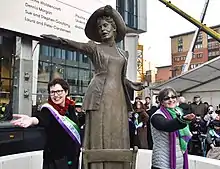
The unveiling was attended by 6,000 people including many who had marched from the Pankhurst Centre near Manchester Royal Infirmary.[16] It was here, as the then home of the Pankhurst family, that the Women's Social and Political Union had been formed.
The event marked exactly 100 years since the first women voted and stood as candidates in a general election.[17][16] Two marches started from two symbolic locations – the People's History Museum and the Pankhurst Centre – ending up at St Peter's Square, which was attended by 6,000 people including 1,000 local schoolchildren.[16] In July 2018, the Portland stone Pankhurst Meeting Circle, was unveiled, designed to encircle the bronze Emmeline.[18]
The statue was funded by corporate sponsors Manchester Airport Group and Property Alliance Group and from the sale of a limited number of bronze maquettes of the statue. A significant donation also came from the Government's Centenary Fund (Centenary Cities).[19][15]:60–77
First In the Fight
In November 2019 a book was published chronicling the history of the WoManchester Statue Campaign and the twenty women on the original long list for consideration. First in the Fight by Helen Antrobus and Andrew Simcock contains essays on all twenty women plus the history of the campaign.[15][20]
Maintenance of the statue
The WoManchester Statue campaign specifically set out to raise money covering the maintenance of the statue.
 In December 2019 Lucy Branch from Antique Bronze Ltd cleaned and re-waxed the statue.
In December 2019 Lucy Branch from Antique Bronze Ltd cleaned and re-waxed the statue. In February 2020 Jon Randles from Proteger Protect Ltd cleaned the meeting circle. Using the Doff system he removed the grime and algae with steam cleaning at 120°C but critically operating at low pressure to avoid damage to the Portland stone.
In February 2020 Jon Randles from Proteger Protect Ltd cleaned the meeting circle. Using the Doff system he removed the grime and algae with steam cleaning at 120°C but critically operating at low pressure to avoid damage to the Portland stone. The Portland Stone meeting circle before cleaning
The Portland Stone meeting circle before cleaning The Portland Stone meeting circle after cleaning
The Portland Stone meeting circle after cleaning On 6 February 2020 the Gm4Women2028 campaign held a rally at the Emmeline Pankhurst Statue.
On 6 February 2020 the Gm4Women2028 campaign held a rally at the Emmeline Pankhurst Statue.
References
| Wikimedia Commons has media related to Statue of Emmeline Pankhurst. |
- "Our Emmeline – my statue by Hazel Reeves". Hazel Reeves.
- Britton, Paul (30 August 2018). "It's our Emmeline – and she's a step closer to taking pride of place in Manchester". Manchester Evening News. Retrieved 19 December 2019.
- Barlow, Nigel (16 July 2018). "Pankhurst Meeting Circle unveiled On Emmeline Pankhurst's 160th birthday". About Manchester. Retrieved 19 December 2019.
- "Suffragette statues mark 100 years of women's first vote". BBC News. 14 December 2018. Retrieved 14 December 2018.
- "Suffragette Emmeline Pankhurst to get Manchester statue". BBC News. 20 January 2016. Retrieved 20 January 2016.
- Britton, Paul (14 December 2018). "Hundreds expected to join march as statue of suffragette leader Emmeline Pankhurst unveiled in Manchester". Manchester Evening News. Retrieved 14 December 2018.
- "The Womanchester Statue Project". Retrieved 7 November 2019.
- Simcock, Andrew (1 August 2014). "Manchester is finally going to redress the imbalance in statues of women". Guardian Online. Retrieved 10 June 2020.
- Williams, Jennifer (27 June 2014). "Manchester needs a second statue to recognise inspirational women - who do you think it should be?". Manchester Evening News. Retrieved 10 June 2020.
- White, Jenny, The Stature Project, in Sutherland, Ella Louise; Mørk Røstvik, Camilla (2015). Suffragette Legacy: How does the History of Feminism Inspire Current Thinking in Manchester. Cambridge Scholars. ISBN 1-4438-8033-7.
- Feld, Kate (27 February 2011). "Warp & Weft exhibition 2014: Equality in crochet form". Creative Tourist. Retrieved 11 June 2020.
- Penny, Sam (30 July 2014). "Green light for Manchester's second female statue as councillor pledges to raise funds by cycling length of UK". Mancunian Matters. Retrieved 10 June 2020.
- "Women Longlist". The Womanchester Statue Project. Retrieved 5 January 2021.
- "Cycle update- Meet the team". The Womanchester Statue Project. 13 May 2015. Retrieved 5 January 2021.
- Antrobus, Helen; Simcock, Andrew (2019). First in the Fight. Manchester, UK: iNostalgia. ISBN 978-1-84547-252-8.
- Pidd, Helen (14 December 2018). "Thousands welcome Emmeline Pankhurst statue in Manchester". The Guardian. Retrieved 20 February 2020.
- "Statue of Emmeline Pankhurst unveiled in Manchester today". Government of the United Kingdom. 14 December 2018. Retrieved 24 January 2019.
- Barlow, Nigel (16 July 2018). "Pankhurst Meeting Circle unveiled on Emmeline Pankhurst's 160th birthday". About Manchester. Retrieved 24 January 2019.
- "Manchester's Emmeline Pankhurst statue gets Government backing". Stylist. January 2018. Retrieved 5 February 2019.
- "Event: First in the Fight – book launch". Manchester: People's History Museum. 14 November 2019. Retrieved 19 February 2020.
